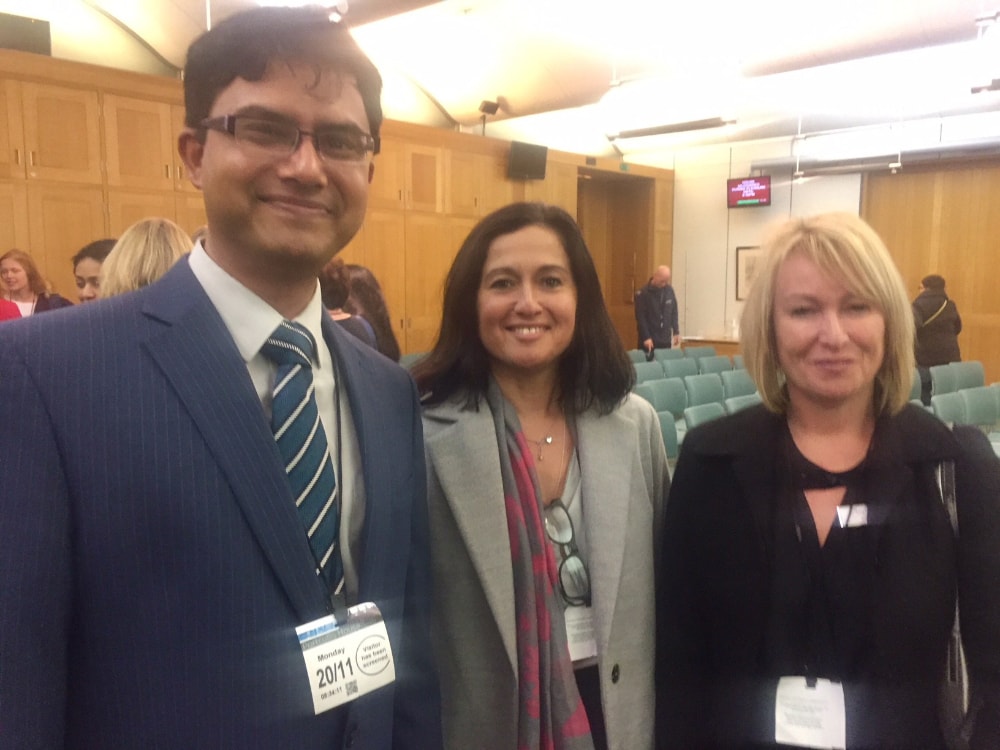
On Monday, 20th November, 2017, my colleague Vanessa Taylor, Head of Maternal Health and Wellbeing at MamaBabyBliss, and I were honoured to attend a debate at the House of Commons about improving the conditions of maternal mental health in the UK. The event was organised by Dr Raja Gangopadhay, an eminent consultant obstetrician and gynaecologist, who specialises in perinatal mental health.
(Photo: from left to right – Mr Raja Gangophadhay, Justina Perry and Vanessa Taylor )
Supporting the mental, emotional and physical wellbeing of women and babies is at the heart of what MamaBabyBliss offers, so both Vanessa and I know a lot about the subject of perinatal mental health. Yet sitting there, listening to a number of experts share the current statistics, it still brings a tear to my eye and acts as a powerful reminder of how much work still needs to be done.
Perinatal Mental Health – The Facts
In the UK at least 1 in 4 women will suffer from anxiety or depression during pregnancy or the postnatal phase.
- The main cause for maternal death in the UK is suicide. Usually when a baby is 6 weeks old.
- The World Health Organisation’s figures also state that as many as 10% of women worldwide suffer from anxiety during pregnancy
- For 30% of women diagnosed with postnatal depression, this is a continuation of anxiety experienced whilst they are pregnant
- Stress and poorly treated mental conditions during pregnancy can lead to preterm labour, low birth weight babies, pregnancy-induced hypertension (pre-eclampsia)
- It is not just mothers and women who are suffering, fathers are too. Paternal depression pre-and postnatally is estimated to affect 10% of fathers for whom there is very little support. The greatest cause of death for men under 45 is suicide.
The cost to the NHS is £8.1bn per year for each cohort of mothers suffering with mental health issues, not only because of the mother’s wellbeing, but because of the long-term impact on the child and her family. The bond and attachment forged between mother and child and the experiences of the first three years of a child’s life are absolutely critical to their long-term mental, physical and emotional development and wellbeing. What this means is that perinatal mental health isn’t just an issue that affects mothers and fathers but one that affects us all.
Prevention is the Cure
But this isn’t just about finding a cure, it is about prevention and this is where we have to start focusing on self-care. There are many experts, studies and research to show that holistic techniques such as daily mindfulness, yoga, massage and meditation can dramatically reduce stress and anxiety during pregnancy. If every pregnant woman could have access to these therapies, imagine the difference it could make and the money that could be saved for an already crippled NHS, where health visitor and midwifery services are being cut.
Making a difference
We already have evidence of the difference that these holistic therapies can make. Vanessa, together with the MamaBabyBliss Nottingham team, works closely with the Nottinghamshire Mother & Baby Unit delivering massage and yoga on a weekly basis to the mothers, babies and staff in the Unit. The results and difference are profound. Yet there are only 17 Mother & Baby Units in the UK and huge gaps in the provision of support and care to women with perinatal mental heath issues across the country. In other words, there are many women suffering in their communities, unsupported and alone. It is these women, who are most at risk of suicide.
How you can help
At MamaBabyBliss we are on a mission to recruit teachers who can deliver pregnancy, mother and baby classes within their communities and support the NHS in their area. Our aim is to ensure that every maternity unit has a teacher nearby. There are 180 maternity units and so far we have 40 MamaBabyBliss teachers. You can find out more about our curriculum of classes and becoming a MamaBabyBliss teacher and making a difference in your community, here. We have also trained staff in 8 Mother & Baby Units and our aim is to have trained all 17 units by 2020.
Actions speak louder than words
At the House of Commons debate, Conservative MP, Tim Loughton, presented the “Building Great Britons” Report which outlines the Government’s manifesto and ‘recommendations for the promotion of optimal development in the first 1001 days to give every baby the best possible start in life.’ Speaking at the debate Mr Loughton urged everyone to contact and lobby their local MP directly for better provision of perinatal care in their constituency. You can read the report here
Time for change
No woman or man deserves to suffer in silence. Yet so many do. The above statistics are based on those individuals who are actually diagnosed. But too many remain undiagnosed, because whether we care to admit or not, the topic of mental health continues to be stigmatised and people find it hard to talk about depression and anxiety. Particularly mothers and fathers who feel like they are constantly judged and feel compelled to wear ‘the mask of motherhood’ or ‘man-up’ and just get on with it.
It’s time to stop the silence and the isolation. It’s time to talk and speak up loud. It’s time to raise the future and create a better world for everyone.
